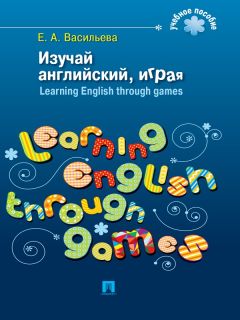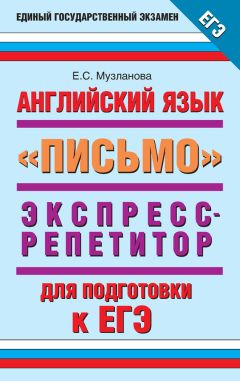Елена Васильева - English grammar: 100 main rules

Все авторские права соблюдены. Напишите нам, если Вы не согласны.
Описание книги "English grammar: 100 main rules"
Описание и краткое содержание "English grammar: 100 main rules" читать бесплатно онлайн.
As soon as you started learning English you have to study basic grammar rules that help understand the language structure and as a result communicate effectively. In the reference guide 100 most common grammar rules are put together and explained in a clear form of tables with several examples to each rule. Referring to this grammar guide may be helpful for those students who have recently started learning English and still find grammar not simple to understand as well as for those advanced users who need just refresh their knowledge of English grammar or clarify some grammar points.
E. A. Vasilyeva
English grammar: 100 main rules
RULE 1. Proper and Common NounsRULE 2. Countable and Uncountable NounsRULE 3. Plural Form Nouns
RULE 4. Irregular Plural Form of NounsRULE 5. Gender of NounsRULE 6. Common and Possessive Cases of NounsRULE 7. Syntactic Functions of NounsRULE 8. AdjectivesRULE 9. Adjective Degrees of Comparison
Positive Degree of Adjectives
1. Description
a busy street, a clever dog, a dull day, an expensive ring, a good attitude, a jealous man, an important signal, a weak accent, young people
Note
Qualitative adjectives can be modified by adverbs of degree.
a dreadfully dull day, extremely hot weather, a fairly large message, a hugely important signal, an immenselyfamous picture, incredibly useful advice, an intensely busy street, a little/a bit expensive ring, a rather good attitude, a reasonably weak accent, quite an interesting list, a slightly somber event, a too jealous husband, an unusually clever dog, very young people
2. Comparison
1) Equality
as + adjective + as
The white kitten is as cute as the grey one.
Playing games is as important as studying.
2) Inferiority
not so + adjective (+ as)
His idea is not so stupid.
The view did not turn to be so splendid as we had expected.
half as + adjective (+ as)
Jimmy is half as tall as Jonny.
Our house is half as big as the neighbours'.
3) Superiority
twice (three times) as + adjective (+ as)
The way was twice as long as yesterday.
Olivia's typing speed is three times as fast as Andrew's.
Comparative Degree of Adjectives
The comparative degree demonstrates the difference between two objects.
1) Superiority
– Most one- and two-syllable adjectives form the comparative degree by adding – er ending.
adjective + – er
clever – cleverer, dull – duller, large – larger, weak – weaker, young – younger
Apple juice is sweeter than orange juice.
These tickets are cheaper than those ones.
Note
– Adjectives ending in – y change the – y into – i and add – er.
busy – busier, pretty – prettier, lazy – lazier, funny – funnier, juicy – juicier
Cf.: shy – shyer, sly – slyer, grey – greyer
– One-syllable adjectives with a short vowel followed by a consonant double this consonant and add – er.
big – bigger, hot – hotter, fat – fatter, thin – thinner
– Several two-syllable adjectives and all three- (and more) syllable adjectives form the comparative degree with more.
more + adjective
more expensive, more famous, more important, more interesting, more profitable, more somber, more useful
The new hairdo makes Andrew more handsome.
Time is more valuable than money.
2) Inferiority
less + adjective
less busy, less clever, less hot, less expensive, less famous, less important, less interesting
This way is less easy than the way Andrew offers.
I prefer less dangerous driving.
Note
Use certain adverbs to enhance the meaning of comparative adjectives.
far/much/a lot
slightly/a little/a bit
Olivia is far prettier than her sister.
This will sound a bit more polite.
Note
It is possible to use the double comparison of adjectives combined with change-of-state verbs.
adjective-er + and + adjective-er
more adjective + and + more adjective
The days are getting shorter and shorter.
The word is becoming more and more ridiculous.
Note
Use the following combination to emphasize the inevitable consequence in degree change of comparative adjectives.
The adjective-er, the adjective-er
The more adjective, the more adjective
The sweeter products are, the unhealthier they are.
The more luxurious goods are, the more expensive they are.
Superlative Degree of Adjectives
The superlative degree demonstrates differences among three or more objects.
1) Superiority
– Most one- and two-syllable adjectives form the comparative degree by adding – est ending.
the adjective + – est
clever – the cleverest, dull – the dullest, large – the largest, weak – the weakest, young – the youngest
– Several two-syllable adjectives and all three- (and more) syllable adjectives form the comparative degree with most.
the most + adjective
the most expensive, the mostfamous, the most important, the most interesting, the most profitable, the most somber, the most useful
2) Inferiority
the least + adjective
the least busy, the least clever, the least hot, the least expensive, the least famous, the least important, the least interesting
The least strong cheese will do for this sort of wine.
What are the least prestigious jobs?
RULE 10. Substantivized Adjectives
Substantivized Adjectives
the + adjective
1) substantivized adjectives denote a whole class of persons characterized by a specific feature. In most cases such adjectives agree with a plural verb.
the elderly, the handicapped, the lonely, the needy
Olivia's aunt works in school for the blind.
The rich also cry.
2) substantivized adjectives may as well refer to the whole nation.
the Japanese, the English, the Dutch
The ancient Chinese first invented paper.
The Welsh try to preserve their language and culture.
3) A number of substantivized adjectives even take the plural ending – s, which let them pass into the category of nouns.
the marines, the moderns, the nobles, the regulars, the Russians
The Conservatives are leading in the polls.
If you want to see the true measure of a man, watch how he treats his inferiors, not his equals.
4) substantivized adjectives indicate abstract notions. such adjectives agree with a singular verb.
the future, the past, the present, the plural, the singular, the unknown, the unreal, the variable, the visible
The obvious is fabulous, but the fabulous is obvious.
You should use the Future Simple in this sentence.
RULE 11. Syntactic Functions of AdjectivesSyntactic Functions of Adjectives
Подписывайтесь на наши страницы в социальных сетях.
Будьте в курсе последних книжных новинок, комментируйте, обсуждайте. Мы ждём Вас!
Похожие книги на "English grammar: 100 main rules"
Книги похожие на "English grammar: 100 main rules" читать онлайн или скачать бесплатно полные версии.
Мы рекомендуем Вам зарегистрироваться либо войти на сайт под своим именем.
Отзывы о "Елена Васильева - English grammar: 100 main rules"
Отзывы читателей о книге "English grammar: 100 main rules", комментарии и мнения людей о произведении.



















